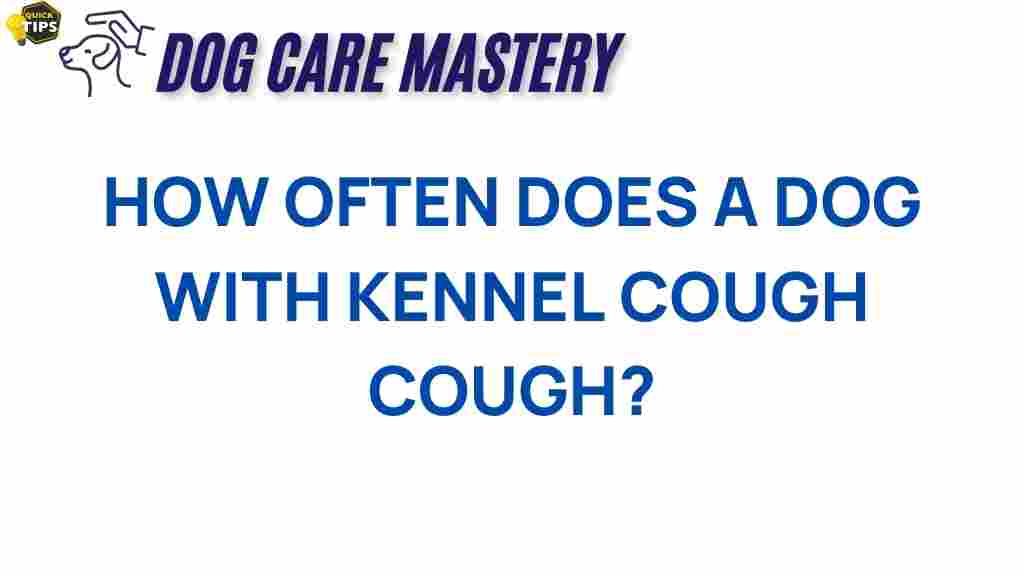Understanding Kennel Cough: How Often Does a Dog with Kennel Cough Cough?
When your beloved canine companion starts coughing, it can evoke a sense of worry. One of the common causes of cough in dogs is **kennel cough**. This infectious disease, scientifically known as infectious tracheobronchitis, can spread rapidly among dogs, especially in crowded areas like kennels, dog parks, or grooming facilities. In this article, we will unravel the mystery of how often a dog with kennel cough coughs and provide you with essential insights on identifying and managing this condition.
What is Kennel Cough?
**Kennel cough** is a highly contagious respiratory disease caused by various pathogens, including bacteria and viruses. The most common culprits are the Bordetella bronchiseptica bacteria and the parainfluenza virus. The disease is characterized by a dry, honking cough and can be accompanied by other symptoms such as:
- Runny nose
- Sneezing
- Lethargy
- Loss of appetite
- Fever
Although kennel cough can be distressing, most dogs recover within a few weeks, especially with proper care and treatment. However, understanding the coughing patterns associated with kennel cough can help you gauge the severity of your dog’s condition.
How Often Does a Dog Cough with Kennel Cough?
The frequency of coughing in dogs diagnosed with kennel cough can vary based on several factors, including the dog’s overall health, severity of the infection, and environmental conditions. Here’s a breakdown of what you might expect:
- Mild Infection: In cases of mild kennel cough, a dog may only cough occasionally, perhaps a few times per hour. The cough can often be triggered by exercise or excitement.
- Moderate Infection: With a moderate case, you might notice more frequent coughing, possibly several times per hour or more, especially when the dog is active.
- Severe Infection: In severe cases, coughing can be persistent and occur multiple times every minute. This constant coughing may indicate that the infection is affecting the dog more seriously and requires immediate veterinary attention.
In general, if your dog is coughing continuously or showing other signs of distress, it’s essential to consult with a veterinarian to determine the appropriate course of action.
Identifying Kennel Cough
Recognizing the symptoms of kennel cough is crucial for timely intervention. Beyond the cough itself, you should monitor your dog for other signs of illness:
- Gagging or Retching: Dogs with kennel cough may gag or retch after coughing.
- Change in Bark: A hoarse or strained bark can be a clue that your dog is experiencing respiratory issues.
- Social Behavior: If your dog is less social than usual or shows reluctance to play, it might be feeling unwell.
Step-by-Step Guide to Managing Kennel Cough
If you suspect your dog has kennel cough, follow these steps to manage the situation effectively:
Step 1: Consult Your Veterinarian
Always start with a visit to your veterinarian for a proper diagnosis. They may perform a physical examination and recommend diagnostic tests if necessary.
Step 2: Follow Treatment Recommendations
Your veterinarian may prescribe medications to alleviate symptoms and prevent secondary infections. Follow their instructions closely.
Step 3: Provide a Comfortable Environment
Ensure your dog has a warm, quiet space to rest. Minimize exposure to irritants like smoke or strong odors, which can exacerbate coughing.
Step 4: Limit Activity
Restrict your dog’s physical activity until they have fully recovered. Avoid walks in crowded areas to prevent spreading the infection to other dogs.
Step 5: Monitor Symptoms
Keep an eye on your dog’s symptoms. If the cough worsens or if your dog exhibits signs of distress, return to the veterinarian for further evaluation.
Troubleshooting Tips for Kennel Cough
There are a few additional tips to help manage your dog’s kennel cough effectively:
- Humidity: Using a humidifier can help soothe your dog’s airways and reduce coughing.
- Honey: A teaspoon of honey may help calm your dog’s throat, but consult your vet before trying home remedies.
- Vaccination: Consider vaccinating your dog against kennel cough, especially if they frequently interact with other dogs.
For more information on kennel cough and its management, you may find the American Kennel Club’s resource page helpful.
Preventing Kennel Cough
Prevention is always better than treatment. Here are some strategies you can employ to reduce the risk of your dog contracting kennel cough:
- Vaccination: Vaccines are available that can help protect against kennel cough. Consult your veterinarian about the appropriate vaccination schedule for your dog.
- Avoid Crowded Areas: Try to limit your dog’s exposure to crowded dog parks, kennels, or grooming facilities, especially during outbreaks.
- Good Hygiene: Maintain good hygiene practices. Ensure your dog is not in contact with sick dogs and clean shared areas regularly.
Conclusion
Understanding how often a dog coughs with kennel cough can help you manage and respond to this common respiratory illness effectively. While mild cases may result in occasional coughing, more severe cases can lead to persistent coughs that require veterinary attention. Always consult your veterinarian for the best course of action and consider preventive measures to keep your furry friend safe from kennel cough.
By recognizing the symptoms, seeking timely treatment, and following preventive strategies, you can help ensure your dog remains healthy and happy. For ongoing updates and resources related to canine health, keep an eye on trusted veterinary websites and articles.
In case your dog has been exposed to kennel cough or is showing symptoms, don’t hesitate to reach out to your veterinarian for expert advice. You can find more information at PetMD’s website.
This article is in the category Health and created by dogcaremastery Team
